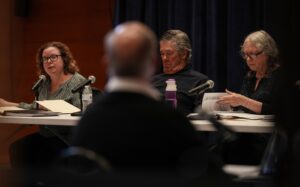TRURO — The board of registrars heard a final set of challenges to voter registrations on Tuesday, April 16 and upheld all three.
Truro voter Jon Slater had disputed the Truro residency, and therefore the right to vote here, of Robert Panessiti, Nancy Medoff, and Daniel Paisner. Panessiti is chair of the town’s finance committee and vice chair of its charter review committee, while Medoff chairs the charter review committee, serves on the zoning board of appeals, and is running for a seat on the Truro Select Board.
Full hearings were held for Panessiti and Medoff, after which Slater withdrew his complaint against Paisner, who is Medoff’s spouse.
These three challenges, filed on Oct. 27, came on the heels of 67 other voter challenges, dozens of which were heard by the registrars in November and January. Twenty-two of those challenged voters withdrew their Truro registrations without a hearing; another 13 voters were removed by the registrars.
A Registration Campaign
The first 66 challenges were filed last fall after news emerged about a self-described “under the radar” voter registration campaign organized by the Truro Part-Time Resident Taxpayers’ Association (TPRTA). That effort encouraged the organization’s members to register to vote in Truro, even temporarily, whether or not it was their domicile.

“Capriciously changing your registration between municipalities is not appropriate and frankly, is not right,” Town Clerk and registrars chair Elisabeth Verde wrote in a letter to the TPRTA. “In fact, it does a disservice to the community.”
A special town meeting had been set for Oct. 21; it was delayed three times as challenges to voter registrations were heard.
By the time the fourth date for the meeting, Nov. 28, rolled around, so many voters turned out that Truro Central School couldn’t hold them, and the meeting was postponed to May 4, when it could be held outdoors under a tent.
Unlike the first group of challenges, the three heard on April 16 were against voters heavily involved in town affairs.
Slater said he intentionally challenged people with municipal roles. “I chose them because as Town officials leading or serving on important committees, at least one of which requires voter status, it seemed appropriate to test the voter registration criteria on persons where voter status was relevant to their official performance of duties,” Slater wrote to the Independent.
Finance committee and zoning board of appeals members must be town residents.
Slater presented documentation of Panessiti’s paying personal property tax in Truro and taking a residential tax exemption in Boston and a professional biography that lists Boston and Truro as home.
Panessiti had three witnesses testify that he is a full-time resident, including Town Accountant Trudi Brazil and Seamen’s Bank President and Truro Finance Committee member Lori Meads.
His third witness, artist Breon Dunigan, said Panessiti “would have to be a superhuman to have the center of his life be anywhere but Truro, because he is so dedicated.” His right to vote in Truro was unanimously upheld by the registrars.
Challenging Medoff, Slater submitted records of her personal property tax paid in Truro, her out-of-town mailing address in Brookline, and her travels to Florida, and business documents connected to Brookline. “She’s quite clearly committing a large number of weeks in certain times of year to being outside of Truro,” Slater said.
Medoff’s car has been garaged in Truro since 2019, she said, and her driver’s license address is here, too. She named a slew of committees on which she served in the past five years and provided hair salon invoices and credit card transactions at local businesses. Her registration was unanimously upheld.
Slater had planned to challenge the supporting documents of Medoff and Panesitti in his arguments against their residency, but because he had not submitted them with his own paperwork, he was not allowed to. He withdrew his case against Paisner after the registrars upheld Medoff’s registration.
“It’s not been possible for me to make the case in the way in which I wanted to,” Slater said.
Same Hearings, Different Views
Raphael Richter, who challenged the residency of 66 newly registered voters last fall, had told the Independent he saw the challenges as protecting the integrity of the voter roll.

But Slater said Richter’s challenges were a threat to voting rights and accused the town of carrying out “voter rights abuse.” The hearings were part of that injustice, he said.
Slater also said the delay of special town meeting that resulted from the challenges and subsequent hearings had succeeded in putting off votes that the town’s leaders “probably would lose.”
Postponing the meeting “was an expression of the Town’s determination to suppress the vote and make sure that opponents of the DPW and of Walsh” — the two major municipal initiatives on the special town meeting warrant — “never got or get to vote,” Slater said.
A new Dept. of Public Works building is the subject of Articles 2, 3, and 4 on the special town meeting warrant on May 4, while a plan for housing at the Walsh property is the subject of Articles 5 and 6.
Suspicions directed at town leadership were voiced loudly last fall, stoked in part by Slater.
Slater helped create a “Take Back Truro” newsletter with Mike Janoplis. Slater was also behind a petition last summer to remove Town Manager Darrin Tangeman, citing fears of Truro losing its rural ethos and “becoming increasingly suburbanized.”
At the second and third dates for the special town meeting — at which Moderator Paul Wisotzky immediately moved the meeting to later dates because the voter challenges had not yet been resolved — protesters organized by Take Back Truro heckled and yelled at Wisotzky.
On April 16, Slater wanted to know why his three challenges were heard so long after Richter’s when they were filed only 10 days later.
Richter’s challenges were filed just before a key deadline and had to be resolved so that the voter roll for the May 4 continuance of that meeting could be finalized. The challenges by Slater came after that Oct. 17 deadline.
Verde also attributed the delay to other factors including Slater’s voluminous public records requests.
Slater has filed six records requests since last August, several of which have multiple parts and seek correspondence between the town and six or eight other people, agencies, or newspapers.
“He wanted that material before the hearings happened, so that took some time,” Verde told the Independent. “And then once we had the presidential primary ahead of us, I had to hit pause on the hearings.”
Residential Tax Exemption
Panessiti is now the fourth challenged voter who has claimed a residential tax exemption (RTE) in another town and had his voter registration in Truro upheld.

In November, the board unanimously voted that Dyanne Klein could keep voting in Truro despite her claiming an RTE in Boston. Klein had also voted in a Boston election one day before switching her registration to Truro.
Rosemary Boyle, who claims an RTE in Boston, was initially removed from the town’s voter roll at her November hearing. She appealed, and her registration was reinstated later that month. At that hearing, Boyle said she had begun filing paperwork to give up her Boston RTE.
According to Boston Assessor’s Dept. records, Boyle still received a residential tax exemption for the fiscal year ending June 30, 2024.
Anne Greenbaum, the 67th challenged voter and the only one to be challenged by someone other than Richter or Slater, had her registration upheld in January. (Greenbaum was challenged by former Town Moderator Monica Kraft.)
Greenbaum claims an RTE on the property she shares with her wife in Jamaica Plain. She told the registrars that she is domiciled in Truro, but her wife’s move from Jamaica Plain to Truro was still “in process,” which accounted for the RTE. The board unanimously accepted that explanation.
Similar to Greenbaum, Panessiti attributed the RTE on his Boston property to his co-owner. “As long as one party who has substantial interest in the property chooses to take that exemption in Boston, I am bound by that,” said Panessiti. “So, I have no control over the situation.”
When Slater asked whether Panessiti would continue taking the RTE, he said, “It is something I am attached to legally.”
Slater said it was not sustainable to argue that a co-owner’s actions had cleared Panessiti of his responsibility.
Verde later told the Independent that, speaking for herself and not her board, “I think it was a gray area. It becomes more complicated when there’s more than one owner. You just have to look at all of the factors as a whole, and not just one factor.”
As of April 19, Verde said, there were no further challenges to voter registrations.

